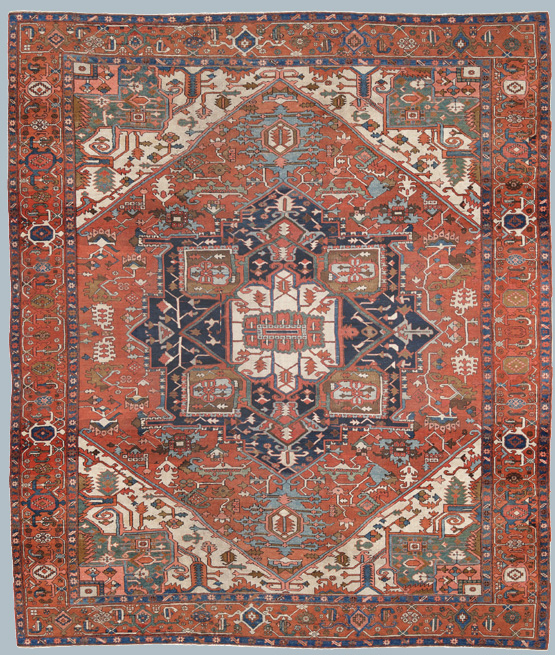code: 3733
type: persian carpets
collection: antique persian carpets
origin: iran
dimensions 301 x 384 cm
9' 10" x 12' 7"
9' 10" x 12' 7"
€32.786,89
$36,065.57
UE Citizens + Italian Vat Tax (22%)UE Companies Italian Vat Tax Free
Available from:
Morandi Tappeti
Condizione: Antico
Out of stock!
This carpet is in Italy - Castelvetro store
Ships in week
Ships in week
Serapi Appreciated since the nineteenth century by the British, who have decorated their houses, it is Persian carpet most recognizable thanks to the design: the field is crossed by vine motifs into stylized curves and angles that will emphasize the patterns, the large central medallion can not diminish the expressive power of angular design. Serapi This is the top in terms of beauty and quality o...leggi tuttof production of Heriz, the fine symmetric knot and canonical implantation place him among the carpets that have made this famous manufactory.
More info »
category: persian carpets
The Persian carpet is the carpet by definition, the best known and appreciated among the hand-knotted carpets. Generally named after the city or area of knotting. Kirman carpet, Kashan, Tabriz, Isfahan, Serapi, Senneh, Bakhtiari, Saruk, Sultanabad, Mahal, Ferahan, Mishan, Josan, Bidjar, Malayer, Hamadan
collection: antique persian carpets
We define the ancient carpets before the war of 1915/18. They have hand-spun wool dyed with vegetable colors, animals or minerals. In some rare cases have been used, limited to certain colors, the first aniline dyes. Saruk rugs, knotted with vegetable colors until 1930, are included in this group
The Persian carpet is the carpet by definition, the best known and appreciated among the hand-knotted carpets. Generally named after the city or area of knotting. Kirman carpet, Kashan, Tabriz, Isfahan, Serapi, Senneh, Bakhtiari, Saruk, Sultanabad, Mahal, Ferahan, Mishan, Josan, Bidjar, Malayer, Hamadan
collection: antique persian carpets
We define the ancient carpets before the war of 1915/18. They have hand-spun wool dyed with vegetable colors, animals or minerals. In some rare cases have been used, limited to certain colors, the first aniline dyes. Saruk rugs, knotted with vegetable colors until 1930, are included in this group






Your comment is awaiting moderation.